THE LAST AND WORST LATIN GRAMMAR.*
WE cannot but think that the author might have spared his fierce threat to punish by legal proceedings "any attempts to pirate
the name or matter" of his book. As for the name, the only persons at all likely to be really aggrieved are the masters of the private schools, who may well resent the gross imputation that this is the sort of grammar which they teach ; as for the matter, that is protected by something far more powerful than any law. Where there is no Value, there can scarcely be theft.
These are hard words, and we shall proceed to make them good.
In the first place, the arrangement and method of the book are as bad as they can be. There is no Table of Contents, no Index
(possibly this is the reason why we have not been able to discover anything about the. comparison of adverbs) ; no paradigms of the declension of substantives are given ; nothing more than a scheme of terminations, about as impracticable a thing for a boy to learn as anything that can be imagined. The vocabulary is pat
together at random, without any alphabetical order beyond the fact that all the words beginning with B come after the words beginning with A. But faults of this sort are nothing to the strange blunders with which the book abounds. We will excuse
in our author the absurd statement that there are three genders, because most of us were content to make it not many years ago. But there are things that cannot be excused. This is his list of
indeclinable substantives :-
Mane, Nihil or Nil, Fas, Nefas, Neguam,
In the morning. Nothing. Lawful. Wicked. Wicked.
Does Dr. Waite think that " lawful " and "wicked" are sub- stantives? And here is a strange statement, "Sui is called reflexive
because it reflects back on the speaker," about as misleading and inadequate an account of the word as it would be possible to give. And here is a specimen of scholarship :—
"Arbitror = think, in sense of judgment on a common subject ; Pato = think in a general sense, unconnected with any particular circumstance."
So we suppose that Descartes ought to have said, "Palo, ergo sum." Here are some extracts from the list of verbs :— " Haeree, to stick, fasten. Luceo, to light."
This is a natural enough confusion between transitive and intran- sitive verbs. But what is the following,—a hazy reminiscence of dolus ?—
" Dole°, to deceive."
And what is to be said of this ?—
" Obliviscor, oblitus, oblivisci, to forget ; (but obIltus, smeared, as with blood,") from which a learner would certainly carry away the notion that obliviscor rejoiced in the possession of a very curious alternative
perfect.
Where he is not blundering, Dr. Waite does nothing, as far as we can see, beyond reproduce in a strange, mutilated form the
rules of grammars now, for the most part, happily obsolete. He
ridicules in his preface the " doggrel stuff written to teach gender" in the Public School Latin Primer, contradicting, by
the way, the experience of most teachers. His own rules for the third-declension nouns is,—" Those increasing (that is,
having one more syllable in the genitive than in the nominative) long, feminine; those increasing short, masculine." This is nothing but the old " Propria quae maribus " rule ; it has not a shadow of reason ; and in fact served only as a peg to hang ex- ceptions upon. But he adds a list of neuter terminations, and
• The Private School Latin Primer, containing the Gist of the Principles of the Latin Language. By Charles Waite, LL.D. The London Scholastic Trading Company. 1872. among them os, with this curious note :—" This is also a word of itself, meaning bone or countenance. As bone it has genitive, ossis ; dative, ossi, &c. ; as countenance, oris." As the two words or, which of course have nothing to do with each other, are the
only neuters with this termination, Dr. Waite has contrived to squeeze a good many absurdities into a small space. When we come to syntax, we find old friends whom we had thought long since dead and buried in full life. Here, for
instance, is one venerable absurdity resuscitated:—" The latter of two nouns signifying different things is put in the genitive sense."
To be perfectly candid, one had to teach this stuff oneself ; now it
seems inconceivable how one could have looked a boy in the face and told him such nonsense, just as it seems impossible to believe that one of the most sensible of English prelates not more than
fourteen years ago forbad one of the ablest of his clergy to officiate because he wore a moustache! Dr. Waite, however, makes no difficulty about it. Here is another charm, so to speak,
which has a certain convenience about it, but is a piece of simple unreason, for all that. "The relative qui is either governed by
the verb or is the nominative to it, according as a word or not comes between it and the verb." The wording, by the way, is our author's own, and so, we fancy, is the whole of the following :—
"Verbs govern (require after them) any case except the vocative." And this,— "1. To, after verbs of motion is translated by supine in ern. To be, by supine in u after adjectives. 2. To, after participles by ad with par- ticiples in chal. 3. To, before one verb and after any other, except as in (1) by present infinitive."
And then we have as an example (2),— "Born to act, natus ad agendum (part)."
Dr. Waite evidently thinking that agendum here is a participle in des.
More clumsy and blundering empirical rules than these can hardly be imagined. But the reader has now had quite enough. We know nothing of Dr. Waite beyond what he tells us in
his title-page, viz., that he is LL.D:, F.R.G.S., F.S.A., and principal and head master of a certain college, which we shall not do him the unkindness of naming. And we should have been inclined to pass over his book in silence, had it not been for an offensive and pretentious preface. In that, and by his title, he challenges an obvious comparison. Of that comparison, as we make it, it will be sufficient to give one side. The Public School Latin Primer is the work of a man who certainly knows something about Latin.



































 Previous page
Previous page